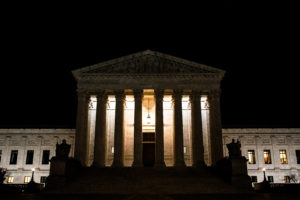
Women Lawyers On Guard Inc., National Association of Women Lawyers, and the Women’s Bar Association of the District of Columbia submitted an amicus brief on behalf of women’s legal organizations in the U.S. Supreme Court case of Dobbs v. Jackson Women’s Health Organization.[1] Our brief challenged Mississippi’s unconstitutional 15-week ban on abortion as a violation of the right established by Roe v. Wade and its progeny to end a non-viable pregnancy without state interference. Thirty women’s bar associations and women’s law student organizations joined the brief.
Amici argued that application of the foundational legal principle of stare decisis requires Mississippi’s 15-week abortion ban to be struck down as unconstitutional under the reasoning of Roe and Planned Parenthood v. Casey. While stare decisis does not favor preserving misguided, erroneous, and outdated precedents such as Plessy v. Ferguson (which upheld racial segregation under the “separate but equal” doctrine), the opposite is true when it comes to cases that recognize new or expanded liberty interests that afford additional rights to individuals. Those cases, such as Roe, Brown v. Board of Education, and Lawrence v. Texas, should be upheld. The Court itself observed in Casey that changing the law simply due to a change in the Court’s membership would make the Court appear to be a political institution. The brief also argued that, for 50 years, women, including women attorneys, have relied on the rights guaranteed by Roe and Casey to advance their careers and achieve greater gender parity. Despite these gains, inequality and inequity persist, and the gap will assuredly grow rather than shrink if these constitutional rights are restricted or extinguished.
We are extraordinarily disappointed, but not surprised, by the ruling of the Court. We are, however, shocked by the reasoning used to support this decision. With the stroke of a pen, this tragic decision creates a generation of women that have less agency over their own bodies than their grandmothers and abrogates constitutional rights that we have relied on for nearly 50 years. This decision will have monumental consequences for individuals and their families in this country. As we have seen in other scenarios, pregnant people will not stop seeking abortions, but they will now have to go to much greater lengths, with predictable dire consequences, to exercise their rights to choose when and whether to have a child. People of color and those struggling to make ends meet, who currently have inequitable access to abortion care, will be even more disproportionately affected as their options become more elusive. Additionally, we do not need a crystal ball to foresee other significant personal liberty rights – birth control, marriage equality, and even interracial marriage – that may be challenged on this basis. The public’s trust in and respect for the Court has now been severely damaged. People perceive that a handful of Justices’ personal, religious, or political beliefs have prevailed over precedent and stability of the law. Whether individuals will be forced to bear children will now devolve in a chaotic manner in each state, and more than half the states are expected to make abortion illegal immediately upon issuance of the Dobbs decision. We will never stop fighting for the right of every person to make this highly personal decision in private, without being subject to state control over their body.
[1] As in our brief, the term “women” is intended to include all persons capable of becoming pregnant, regardless of gender identity, sexual orientation, or any other characteristic, except where used in proper nouns or to describe case holdings, quotations, or statistics.
“Whatever the exact scope of the coming laws, one result of today’s decision is certain: the curtailment of women’s rights, and of their status as free and equal citizens.”
JUSTICE BREYER, JUSTICE SOTOMAYOR, and JUSTICE KAGAN, dissenting.
